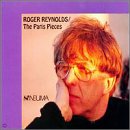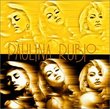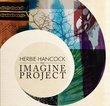| All Artists: Roger Reynolds, David Robertson, Peter Eötvös, Ensemble InterContemporain, Scott Dunn, Philip Larson, Marie Kobayashi Title: Roger Reynolds: The Paris Pieces Members Wishing: 0 Total Copies: 0 Label: Neuma Release Date: 8/1/1996 Genre: Classical Styles: Opera & Classical Vocal, Chamber Music, Instruments, Electronic Number of Discs: 2 SwapaCD Credits: 2 UPC: 785924509128 |
Search - Roger Reynolds, David Robertson, Peter Eötvös :: Roger Reynolds: The Paris Pieces
 | Roger Reynolds, David Robertson, Peter Eötvös Roger Reynolds: The Paris Pieces Genre: Classical
|
Larger Image |
CD DetailsSimilar CDs
|
CD ReviewsThe leading edge, too far out ahead for most to see R. Hutchinson | a world ruled by fossil fuels and fossil minds | 01/20/2002 (4 out of 5 stars) "This is invaluable documentation of the electro-acoustic works of Roger Reynolds. The product of time spent at IRCAM, Pierre Boulez' Paris institute, some of the pieces bear a strong resemblance to "Repons," the highest-profile Boulez composition using the state-of-the-art IRCAM technology. This is even less surprising since they were recorded by Boulez' Ensemble Intercontemporain! "Archipelago" was composed in 1982-3, for 32 instruments and 8 tracks of computer generated sound. On hearing a performance, John Cage said to Reynolds "[t]his should keep you busy for the rest of your life," because of its rich complexity. "Summer Island" and "Autumn Island" are spin-offs of "Archipelago," featuring oboe and marimba respectively. "Summer Island" is stunningly beautiful, the easiest piece on the disc to appreciate on first hearing. "Odyssey, an opera in the mind" (1989-93) is a difficult work, to say the least. I will be listening to it alongside Nono's "Prometeo" for years, I'm sure, plumbing its depths. Featuring text from a poem by Samuel Beckett, Reynolds, believe it or not, uses equations from chaos theory to organize the computer-manupulated vocals, using the lyrical pitch structures of the voices as the basis for sound reorganization. Some pieces, such as Reynolds' string quartets ("Coconino," recorded by the Arditti Quartet), I find engaging and compelling despite my patent failure to completely understand the compositions' structures. With "Odyssey" I am not as compelled, and hence the 4 stars instead of 5. I remain convinced that Roger Reynolds is one of our most under-recognized contemporary composers. I only wish that all those who think Glass or Gorecki is the epitome of the current composer could hear Reynolds' work!" Music in the Right Era of Manipulated Sound Grady Harp | Los Angeles, CA United States | 05/11/2006 (4 out of 5 stars) "Roger Reynolds states 'I believe in as wide a range of musical involvements as is feasible given the reality of life.' Hearing his works requires a lot of preparation on the part of the audience: walking into the pieces cold might otherwise cause such mental confusion, trying to make the whole seem worth its parts, that it is easy to become aurally lost. His musical compositions or amalgams often include text and electronic elements (some critics praise him as an innovator in the use of multi-channel spatial explorations). Born in 1934 in Detroit, MI he is an important American composer whose roots seem to be found in the works of Ives, Varese, and Cage
The problem with Reynolds' works, finely composed though they be, is that they often include texts that really must be comfortably well known to the listener in order to hear the music. And he is in need of editing his longer works to remain within the concentration pattern of even the most sophisticated classical music lover. Point of reference is the first CD of this 2 CD set, an entire CD is devoted to 'Odyssey, an opera in the mind, for soloists, ensemble & computer processed sound' in which the complex texts are both sung and spoken in real time as well as with prerecorded excerpts. The work is performed by the always superb InterContemporain Ensemble with soloists Marie Kobayashi and Philip Larson conducted by David Robertson. At a recent LA Philharmonic concert Esa-Pekka Salonen conducted the World Premiere of 'Illusion', a work commissioned by the orchestra and one meant to explore all of the sound possibilities of this acoustic wonder of a Hall. The piece begins with sounds on speakers in the foyer and steps of the hall and when the audience is seated prerecorded tapes of speakers bounce around the hall giving the text about Agamemnon, Iphigenia and Cassandra and the Greek history of Troy. Then the small ensemble on stage included Agamemnon with three voices (speaker, baritone and cellist!), along with female speaker and clarinet as Iphigenia, and soprano and piccolo as Cassandra! It is an hour-long quasi-opera and mixes acoustical manipulations of spoken word and computer sounds with the whole piece. Complex, mind-boggling, and in desperate need of editing! The remaining pieces on this recording fit comfortably onto the second CD and are brief and well conceived: 'Summer Island, for oboe & computer generated sound', 'Archipelago, for 32 instruments & computer generated sound', 'Autumn Island for marimba', and 'Fantasy for pianist', each with David Robertson conducting the soloists and the InterContemporain Ensemble. Stating that Roger Reynolds' music requires work on the part of the audience is in no way a negative statement. Too often we enter a concert or play a recording to be entertained. Reynolds demands we be participants and would that that were the case for all classical music listening, there would be no threat of the extinction of CDs! Food for the soul and the ear is food for the mind. Grady Harp, May 06 " |

 Track Listings (9) - Disc #1
Track Listings (9) - Disc #1


